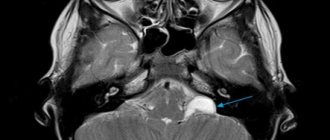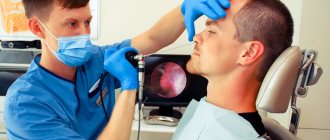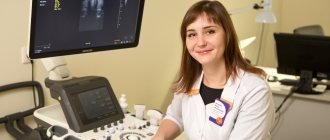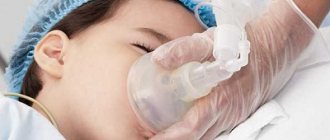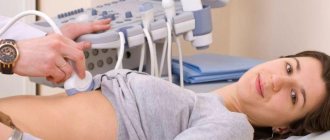Electrocardiography (ECG) is one of the leading medical technologies used to diagnose diseases in the field of cardiology, which is based on recording heart impulses during muscle activity. Electrocardiography is a method that allows you to identify a wide range of ailments that negatively affect the functioning of the heart and blood vessels. At the same time, special equipment allows you to obtain accurate results, regardless of the stage, beating rhythm and other factors. Using the technique, it is clarified in which area the myocardial infarction is located.
An electrocardiogram of the heart reflects electrical activity, which allows for preventive studies, for example, in pregnant women, children, the elderly, and also makes it possible to clarify diagnoses for prompt decision-making in favor of effective treatment. Latum Clinic invites patients to undergo electrocardiography - a procedure that becomes decisive in making a diagnosis. Using our services, you can count on high-quality medical service, provided by competent specialists and modern technical equipment. With us, you don’t have to waste time on queues and appointments - the procedure is available on any day and time convenient for you. You can undergo the examination at a branch convenient for you: Seligerskaya metro station, Korovinskoe highway, metro station st. 800th anniversary of Moscow, Dmitrovskoe highway. The cost of electrocardiography varies and allows everyone to receive quality service with informative results.
Why is an ECG of the heart done?
What is electrocardiography? This is a popular and effective technique that allows you to promptly identify any deviations in the functioning of the cardiovascular system. As part of the manipulation it is possible to:
- 1. Assess the frequency, the source of the heartbeat rhythm.
- 2. Determine the lack of blood flow and diagnose coronary disease.
- 3. Confirm that there is a myocardial infarction and specify its location.
- 4. Diagnose ventricular hypertrophy and assess the general condition of the organ.
Electrocardiography has been used for a long time and to this day has no competitors in terms of diagnostic potential. In combination with other studies, it allows you to get a complete picture of the state of the cardiovascular system. Due to the fact that the price of electrocardiography is low, this allows patients with suspected problems to take timely measures in order to begin treatment as quickly as possible.
Additional Research
Children are prescribed the following tests as part of their medical examination:
- General blood analysis . Recommended for everyone after reaching 12 months. Most often, it is used to detect iron deficiency anemia. So, when hemoglobin “drops” below 100 g/l, it is necessary, firstly, to take a course of iron supplements, and secondly, to hold off on vaccinations, with the exception of the Mantoux test.
- General urine analysis . Aimed at identifying pathologies of the urinary system.
- Stool analysis - general and for helminth eggs. Allows you to exclude enterobiasis.
- Perinatal scraping . Makes it possible to detect pinworm eggs, which are located in the perinatal folds. If the diagnosis is confirmed, then treatment is carried out, then a new examination, and then vaccination.
- ECG . The simplest and most informative way to study the activity of the heart. It is painless, fast and safe. Using an ECG, heart rate, metabolic disorders of potassium, magnesium and calcium are detected, as well as a number of diseases, including angina pectoris, heart defects, metabolic disorders, etc.
Electrocardiography: indications for the procedure
You can come for an ECG at your own request or as prescribed by a cardiologist. You can get a referral at your local clinic or at our medical center. You should seek medical help if you have the following symptoms:
- 1. Weakness that appears for no apparent reason.
- 2. Frequent headaches and fainting.
- 3. Frequent heart rate that is not associated with physical activity.
- 4. Shortness of breath that appears even with minimal activity.
- 5. Patients over 40 years of age should attend the procedure at least once a year.
For the purpose of prevention, it is also worth undergoing an ECG if there are additional risks. For example, if the patient smokes, drinks alcohol and drugs, eats irrationally, with fatty and spicy foods predominating, and has a history of infectious diseases.
Electrocardiography should also be prescribed for direct symptoms:
- 1. The doctor suspects serious diseases of the cardiovascular system, for example, heart attack, defect, inflammation. The technique is relevant for high blood pressure, arrhythmia, etc.
- 2. Increased blood sugar levels, problems with the thyroid gland, impaired metabolic processes.
- 3. Obesity, exhaustion.
- 4. Chronic diseases of the respiratory system.
List of doctors: what specialists does a child need to see every year?
You can undergo medical examination at the clinic at the child’s place of registration or at a licensed multidisciplinary clinic. In the second case, it will be much more convenient for both parents and the baby, because there are no queues, and each patient receives as much attention as possible.
Pediatrician
The medical commission should begin with an appointment with the pediatrician. He will give directions for tests and provide a list of specialists who need to be visited.
At the 12 month visit, the doctor:
- weighs the child (average weight – 10 kg), measures height (average height – 75 cm);
- measure the circumference of the chest (norm – 49-50 cm), head (norm – about 46 cm);
- examine the fontanel (most often it is already closed);
- examine the oral cavity (there should be approximately 8 teeth);
- will provide parents with consultations on nutrition, complementary foods, and vitamins;
- will give vaccinations (against Haemophilus influenzae, DPT, chickenpox, polio, measles), perform the Mantoux test;
- will give recommendations for overweight or underweight.
In three days you will need to come to the appointment again to show the Mantoux test.
Information about visiting a specialist in our clinic - “Pediatrician at SM-Clinic”
Neurologist
At one year of age, a neurologist examines the fontanel, measures the head circumference (from birth it should increase by about 12 cm), and evaluates reflexes. For a specialist, it is important whether the child speaks, can walk, and what kind of gait he has. The doctor evaluates speech development (it is noted, by the way, that girls begin to speak earlier and more). Normally, by the age of one year, a child can already pronounce several words meaningfully, show and name parts of the body. It is important to understand that neurological pathologies are very insidious. They need to be diagnosed in time so that psychomotor development is not impaired. Therefore, an appointment with a neurologist cannot be neglected, although for some mothers it seems unimportant. Alarming symptoms in the neurology profile include:
- frequent regurgitation;
- muscle hypertonicity;
- sleep disorders;
- trembling of hands and chin.
They should alert you both independently and in combination with other disorders.
Information about visiting a specialist in our clinic – “Children’s neurologist at SM-Clinic”
Surgeon
A pediatric surgeon examines the child for diseases that can be treated surgically. If they are detected, the number of required visits increases.
During the appointment, the doctor examines the abdomen in order to timely exclude or diagnose an umbilical or inguinal hernia. Boys undergo an examination of the external genitalia to assess the degree and correctness of their development (for example, to exclude undescended testicles or dropsy). It is also important to identify pathologies in the development of the chest organs.
Information about visiting a specialist in our clinic - “Pediatric surgeon at SM-Clinic”
Dentist
When a child reaches the age of 12 months, he already has 4 lower and 4 upper incisors. The doctor examines the oral cavity to assess the color of the enamel, the bite that has begun to form, and to detect chips and caries in time. The fact is that baby teeth have thin and sensitive enamel, and a child at this age “puts everything in his mouth,” which is why damage is inevitable. The doctor gives parents recommendations on how to care for their first teeth and ensure disease prevention.
This specialist is not represented at the SM Clinic.
Ophthalmologist
At an appointment with an ophthalmologist, an examination of the fundus of the eye is performed. This is necessary in order to detect increased intracranial pressure in time. Consultation with this specialist is especially important, because by the age of 12 months, almost all children have a closed fontanelle, which means neurosonography cannot be done.
Visual acuity is checked against age standards. Can be diagnosed:
- astigmatism;
- farsightedness;
- myopia;
- strabismus;
- predisposition to visual impairment.
The set of procedures also includes examining the veins of the eye, checking how the pupils react to light, how the child follows moving toys and focuses his gaze. Can be diagnosed at an early stage:
- diseases and malformations of the lacrimal canals;
- congenital glaucoma;
- conjunctivitis;
- congenital cataract;
- and etc.
Eye drops may be used at your appointment.
The doctor provides advice to parents on how to properly care for their child's eyes.
Information about visiting a specialist in our clinic – “Children’s ophthalmologist at the SM-Clinic”
Otolaryngologist
An otolaryngologist (ENT) deals with ear, nose and throat problems and their prevention. The specialist provides advice to parents on caring for mucous membranes, preventing inflammation and colds, and answers all questions. At 12 months he examines children for the first time. The sample may reveal a deviated nasal septum and narrow nasal passages. Sometimes enlarged tonsils or adenoids are found. Besides:
- the ears are examined;
- the condition of the larynx is assessed;
- Swabs are taken from the nasal mucosa, tonsils, and throat.
Young children may not always complain about their health. At the same time, the body can develop such dangerous and common diseases as tracheitis, otitis media, tonsillitis, bronchitis, inflammatory processes in the upper respiratory tract, and laryngitis. Wax plugs are often diagnosed and need to be cleaned out. Only a doctor is able to detect the problem and provide assistance before a mild illness turns into a more severe one.
Information about visiting a specialist in our clinic – “Children’s ENT in the SM-Clinic”
Psychiatrist
A child psychiatrist provides assistance to children who have hereditary, congenital, acquired pathologies and abnormalities. He evaluates the correct pace of development and the characteristics of the child’s temperament. The doctor provides consultations to parents, talks about creating the right environment and atmosphere in the family, education, etc. If necessary, children are prescribed additional examinations, for example, EEG or psychodiagnostics. If pathology is detected, treatment may include psychotherapy, medication, psychological correction, etc.
This specialist is not represented at the SM Clinic.
How is electrocardiography performed?
Some visitors to medical institutions do not know how electrocardiography is performed:
- 1. The office has a couch on which the study is performed.
- 2. The doctor attaches the electrodes to the chest and limbs.
- 3. Next, you should lie in a calm position, as the device operates and records the readings of the heart muscle. The information is displayed on a computer monitor and then printed on paper.
Our clinic specialists interpret the results. The conclusion is given to the person examined - the process takes from 15 to 30 minutes. If necessary, you can get advice from an experienced cardiologist at the center.
Dangerous diseases
The ECG shows changes characteristic of such heart diseases:
- congenital heart defects (ventricular or atrial septal defects, enlarged chambers, abnormal arrangement of blood vessels);
- inflammation of heart tissue (endocarditis, myocarditis);
- impaired conduction and contractility of the myocardium of the heart, arrhythmia, angina pectoris;
- imbalance of electrolytes, metabolic disorders in the heart muscle, characteristic of non-cardiac diseases (gastrointestinal, diabetes mellitus, etc.).
24-hour Holter ECG monitoring
Not in all cases it is possible to detect other problems with an organ such as the heart. After all, the procedure takes a minimum of time. To analyze the state of the cardiovascular system, daily monitoring is carried out, which involves the use of a compact device. It is installed on the human body, after which the device takes readings for 24 hours. The presence of the device does not affect the quality of life and allows you to do everything that you are used to. The study allows one to assess the state of the entire system under conditions familiar to the subject. In this case, various parameters are taken into account, arrhythmia attacks are counted, ischemia and many other factors are detected.
You can sign up for a consultation for electrocardiography using the feedback form or by making a phone call. We offer high-quality medical care that allows you to get an accurate picture of the state of the cardiovascular system. Registration is possible for any convenient day and time.
Contraindications for ECG
Electrocardiography of the heart is an absolutely safe diagnostic method and allows you to obtain maximum information about the condition of the heart muscle without harm to health. A disadvantage of the procedure may be low information content in some cases. The accuracy of diagnosis decreases with extensive injuries and deformities of the chest. Contraindications exist only for ECG monitoring with stress.
The use of physical and medicinal stress is contraindicated in the presence of:
- aortic aneurysm dissection;
- severe heart failure;
- pathological disturbances of rhythmic contractions of the heart;
- infectious diseases.
In case of recent myocardial infarction, only standard electrocardiography is also prescribed.
Why should you contact the Ultrasound+ clinic?
Unlike cardiac centers, we provide services at home: the doctor will arrive with all the necessary equipment, and the sick person will not have to experience the additional stress of visiting the hospital. You can call a cardiologist to your home to take an ECG for a bedridden patient, a baby, or a pregnant woman. In addition to convenience, this format of paid examination has other advantages:
- You will immediately receive a transcript of the cardiogram from an experienced cardiologist and a treatment plan. If necessary, the specialist will prescribe additional tests.
- You can undergo the examination at a convenient time. Our doctors travel on weekends, holidays, and in the evenings.
- You can call a cardiologist urgently. The doctor will arrive within 2 hours after the call and conduct an examination, determining the patient’s condition. Our services include assistance with hospitalization in cardiology if there are medical indications.
Contacting the Ultrasound+ clinic means enlisting the support of qualified doctors who make accurate diagnoses and prescribe effective treatment based on examinations. Save time - call a doctor at home and get prompt medical care without hassle.
Principle and safety of the procedure
Each pumping function of the heart is preceded by electrical stimulation, which usually originates from the sinus node, the primary pacemaker, and passes through the cardiac excitation conduction system to the muscle cells. These changes in electrical potential can be examined using ECG electrodes on the body's surface and recorded on a time scale. However, it should be noted that electrocardiography only shows the excitation line within the heart, but not the actual ejection power. Therefore, as a rule, additional research methods, such as echocardiography, are necessary.
The electrocardiogram curve can be divided into different sections, each of which underlies very specific electrophysiological processes in the heart. ECG assessment can be performed manually using a special ruler or a computer.
An ECG is an absolutely safe procedure that poses no danger even to pregnant women and small children. That is why women should not be afraid of research that allows timely detection of various disturbances in the functioning of the heart, which experiences increased stress during gestation.

